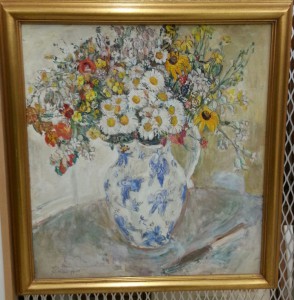YIVO Archives: Recent Accessions
The YIVO Archives receives new items and collections on a weekly basis. These include donations of organizational records, manuscripts, printed materials, family history materials, photographs, sound recordings, artworks, and films related to the many topics covered by YIVO's archives and library.
Yedies will begin reporting on these acquisitions on a monthly basis. This week, we feature a couple of highlights from the most recent donations.
(Special thanks to YIVO Associate Archivist Leo Greenbaum for providing the information for this report.)
Oil painting by Abraham Manievich received
Roslyn Levin, daughter-in-law of Jacob Levin (a founder of Yiddish secular education in the U.S. and a pioneering teacher, administrator, and curriculum developer of the Workmen's Circle schools), has donated an original oil painting, “Still Life with Wildflowers” (n.d.), by the noted artist Abraham Manievich, a friend of the Levin family. Manievich, born in Mstislavl, held his first solo exhibition in Munich in 1907, and, after the Russian Revolution, became one of the founders of the Ukrainian Academy of Fine Arts. He emigrated to the U.S. in 1921.

Read more about Abraham Manievich.
The YIVO Archives holds the papers of Jacob Levin (RG 1341), which includes materials on the Workmen’s Circle, Camp Kinderland, Camp Naivelt, the Central Yiddish Culture Organization, the Abraham Reisen Club, and the Jewish Labor Committee.
Louis L. Lipshutz donates Yiddish manuscripts of his father, Jacob Lipshutz
Louis L. Lipshutz has donated the papers of his father Jacob Lipshutz, a Ukrainian-born capmaker and owner of a millinery shop in Philadelphia, who left behind 225 Yiddish manuscripts including poetry, stories, memoirs, and musical compositions, as well as audio recordings.
The YIVO Archives collects not only the papers and manuscripts of well-known writers and artists, but also the work of countless men and women who did not achieve fame, but who nonetheless played their own key roles in creating Jewish and Yiddish culture in Europe, the Americas, and the U.S.
Visit the Jacob Lipshutz web site.